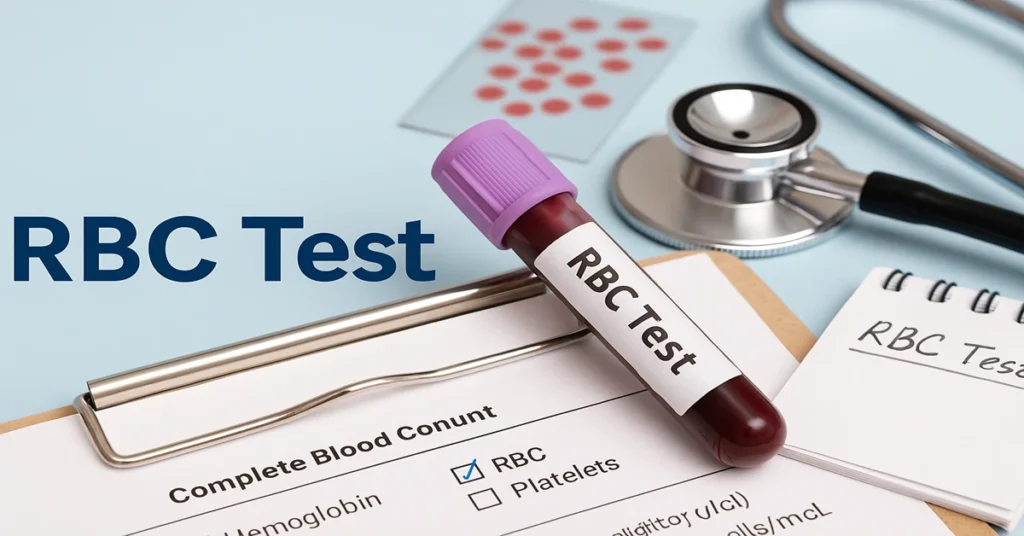What is the RBC Test? The RBC test measures how many red blood cells (RBCs) you have in a volume of blood. Red blood cells carry oxygen from the lungs to the rest of the body and bring carbon dioxide back to be removed. The RBC test is usually part of a Complete Blood Count (CBC), a basic blood panel used to check general health and to find conditions like anemia (low RBC) or polycythemia (high RBC).
Where Are RBCs Synthesized/Produced in the Body?
Red blood cells are made in the bone marrow, the soft tissue inside large bones (like the ribs, pelvis, spine and long bones). This production process is called erythropoiesis. A hormone called erythropoietin, mostly released by the kidneys, tells the bone marrow to make more red blood cells when the body needs them.
Main Functions and Importance of RBCs
- Oxygen transport: RBCs contain hemoglobin, which binds oxygen in the lungs and delivers it to organs and tissues.
- Carbon dioxide removal: RBCs carry carbon dioxide (a waste) from tissues back to the lungs for exhalation.
- Help keep blood pH stable: By carrying gases and buffering acids, RBCs support normal blood chemistry.
- Support daily energy and organ function: Without enough RBCs, organs and muscles get less oxygen and work less effectively.
RBCs are essential for life — even a small drop in count can cause tiredness and poor function of organs.
Causes of Low RBC Count (Anemia)
Low RBC count — or anemia — can happen for many reasons:
- Iron deficiency: Most common cause; from poor diet or blood loss.
- Vitamin B12 or folic acid deficiency: Needed to make healthy RBCs.
- Chronic diseases: Kidney disease, cancer or long infections can reduce RBC production.
- Bone marrow problems: Disorders like aplastic anemia or leukemia reduce production.
- Blood loss: From surgery, injury, heavy periods, or internal bleeding.
- Autoimmune disorders: Body attacks its own red cells.
- Genetic conditions: Thalassemia or sickle cell disease affect RBC production or shape.
Symptoms of Low RBC Count
- Feeling very tired or weak
- Pale skin or pale lips
- Shortness of breath on small effort
- Fast or irregular heartbeat
- Dizziness or light-headedness
- Cold hands and feet
- Difficulty concentrating or headaches
Causes of High RBC Count (Polycythemia)
High RBC count means the body has more red cells than normal. Causes include:
- Living at high altitude (less oxygen in air so body makes more RBCs)
- Chronic lung disease (COPD and others)
- Certain heart problems that lower blood oxygen levels
- Dehydration (makes blood more concentrated)
- Smoking (raises carbon monoxide and stimulates RBC production)
- Bone marrow disorders like polycythemia vera (overproduction of RBCs)
- Performance drugs (some athletes use EPO or steroids; these raise RBCs)
Symptoms of High RBC Count
- Headache or dizziness
- Red or flushed face and skin
- Itching (often after warm shower)
- High blood pressure
- Nosebleeds
- Blurred vision
- Higher risk of blood clots, which can cause stroke or heart attack
Reference Ranges
(may vary slightly by lab and units)
- Men: about 4.7 – 6.1 million cells/mcL
- Women: about 4.2 – 5.4 million cells/mcL
- Children: about 4.1 – 5.5 million cells/mcL
- (Always check your lab’s reference range on the report — ranges can differ by age, pregnancy and method.)
Sample Type
- Sample Taken: Whole blood from a vein (usually in the arm)
- Tube Used: Lavender top (EDTA tube)
- Test is quick and safe; most labs give results the same day or within 24 hours.
Test Preparation
- Usually no fasting is needed for an RBC test.
- Drink normal water; avoid dehydration because it can falsely raise RBC concentration.
- Tell your doctor about medicines you take (iron supplements, blood thinners, or other drugs).
- If you recently had heavy exercise, smoking, or altitude exposure, tell the lab, as these can change the result.
- Sometimes the doctor asks for the RBC test with a full CBC or other tests, so follow their instructions.
When to Consult a Doctor
- If you feel ongoing tiredness, breathlessness or fainting spells.
- If test results show RBC counts consistently below or above normal range.
- If you have pale skin, frequent nosebleeds, or unexplained headaches.
- If you have known kidney disease, lung disease, heart problems or family history of blood disorders — regular checks are important.
- If you are pregnant or planning pregnancy and have low RBC or iron deficiency, consult your doctor promptly.
~END~

